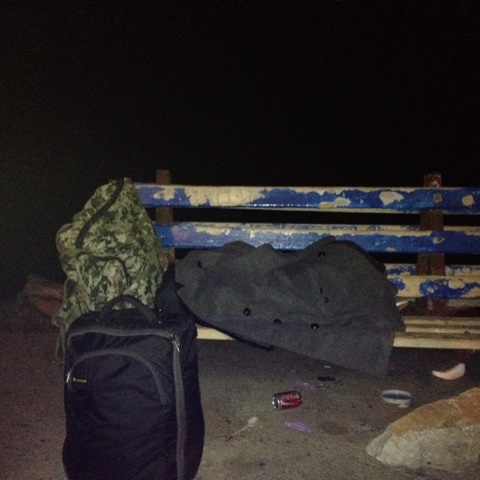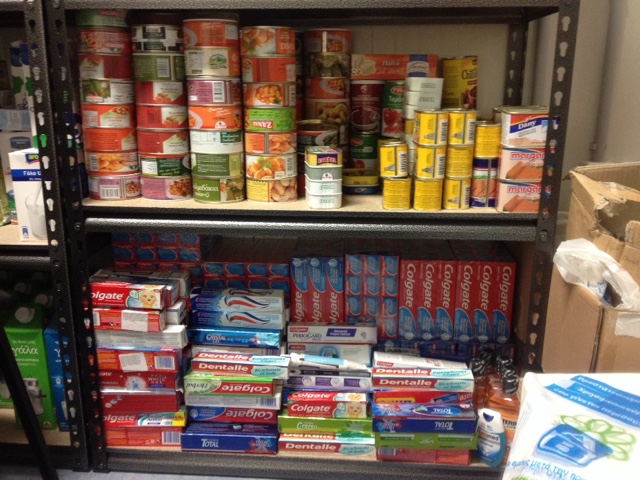Sunday means a day off for the volunteers that work in the refugee camp. We had planned to go to the north of the island with Marianna and Michael, the local people we are renting our room to but that have become friends by now, so we could see the place the plastic boats arrive to and help if needed. In the morning it was raining hard and we really doubted that the trip was going to go ahead. "Surely the smugglers wouldn't put the boats in the water with this weather" we thought. But we were wrong.
We headed to the northernness point of the island of Lesvos and through the 40km road along the coast we counted hundreds of plastic boats and probably thousands of life jackets. It was unbelievable. Bear in mind refugees have to walk this road in the opposite direction so they can reach the registration points and board the ferry. It's a mountain road with no side pavement. Someone's there's buses to take the woman and children. Only sometimes. Men have to walk the road. 40km of up and down twisty road with no side pavement. It's dangerous to even drive this thing. Imagine walking it.
We met Marianna and Michael after I contacted Marianna on Air BnB to rent her house. She asked me why I was coming to Lesvos and I didn't want to say the reason because I was scared she was not going to approve of us being here to help refugees. I decided to tell her and her reply was something like "Thank you for taking the step to come and help these people!". I was so relieved! I had seen many news articles about the people of Lesvos not being happy about the situation. Since that first contact Marianna was a friend that helped us all along the way and beyond her duty. We are very thankful for her and Michael, her partner!
As we drove to the north they explained details about what the local population is doing to help the refugees. I was so shocked and happy to hear that they don't know anyone in Mytilini (the city where we are in the island of Lesvos) that is against refugees arriving. They told us they know about a group of people that support a right wing political party that is obviously against the events, but that is all. This is such a big contrast from the amount of hateful comments I read on the news articles that are posted by Portuguese newspapers. I scan ALL the comments looking for a positive one. In the last few days I didn't find a single comment from someone that emphasises with the situation of the refugees. In fact, when the news about the 1 year old child that died this week was posted, I read a comment saying "good. That's one less terrorist entering Europe". In all honesty, this comment made me feel more sad and angry than all the horrors I've seen since arriving. Yes the situation on the island is bad, but there's no one here not trying to help these people escape war. Everyone empathises with their situation. No one judges you for helping them. And why would they? Helping is always the right answer. ALWAYS.
We knew we had arrived to the correct spot when big tents started emerging on the beach. They were from all the relief organisations that wait for the boats to arrive so they can welcome them and treat people for hypothermia, take them of wet clothes, make sure everyone is ok, etc.
One of the groups at the beach is the "Volunteers for Lesvos". They are the local people that organise shifts to help at this place. They have two big tents full of clothes, blankets and other items that the refugees may need. We sat with them and waited. They told us some boats had arrived early in the morning. The sea was so rough. There were thunder and a lot of rain. I prayed for us not to see any boats. It would mean people were safe in land. After a couple hours we went for lunch at a taverna near the beach. Today is Jack's birthday and it was nice to have a moment to sit down and pretend we are normal people on a holiday destination an that the world is in peace and nothing bad is happening around us. Well... That was until a group of photographers shows up at the taverna and starts talking about how "the smuggler came back and brought another 350 people on the wooden boat". They start showing pictures around and videos and 2 minutes later they are being uploaded to computers and sent off to the press. More journalists arrive and do the same. As this commotion is happening I realise the four of us at the table are so shaken by what's happening that we are not reacting or moving. We try and listen to more information. According to the reporters the smuggler charges 2500€ per adult on the boat and 1500€ per child. He already did two trips that day with 350 people each time.
I'll save you the trouble of figuring out how much he earned that morning.
If we assume half the people he transported were children, he would have made 1 250 000€ in one morning. Yes, that is over 1 million euros in one morning. Think about that for a second. How angry does it make you feel?
As the photographers talk I notice more people showing up for lunch. They are wearing wetsuits and yellow t shirts. I read on their t shirt that they are lifeguards and they are from Spain. I think the organisation's name is Pro Active - open arms. They are the ones that risk their life jumping in the sea to help the boats when they arrive. Hoping they don't turn over and no one drowns.
I don't really know what happened after. All these things played in my mind for the rest of the day. We didn't see any boats coming in. I a silly way I was glad that the only boat that was making trips was this big wooden boat that drops the people and returns to Turkey, as opposed to the plastic boats, which don't usually bring a smuggler and just get deflated when they reach Greece.
As we leave the restaurant I glance over the shoulder of one of the photographers uploading the photos. I see a few of the boat as it's still in the water and many children's faces are terrorised about the situation as they hold their parents firmly.
The last thing I hear the photographers saying is that they are going to take the information and photos they have to the police and coast guard. They don't seem very hopeful about it making a difference. Neither do I. Hoping for the best but expecting the worst.








































